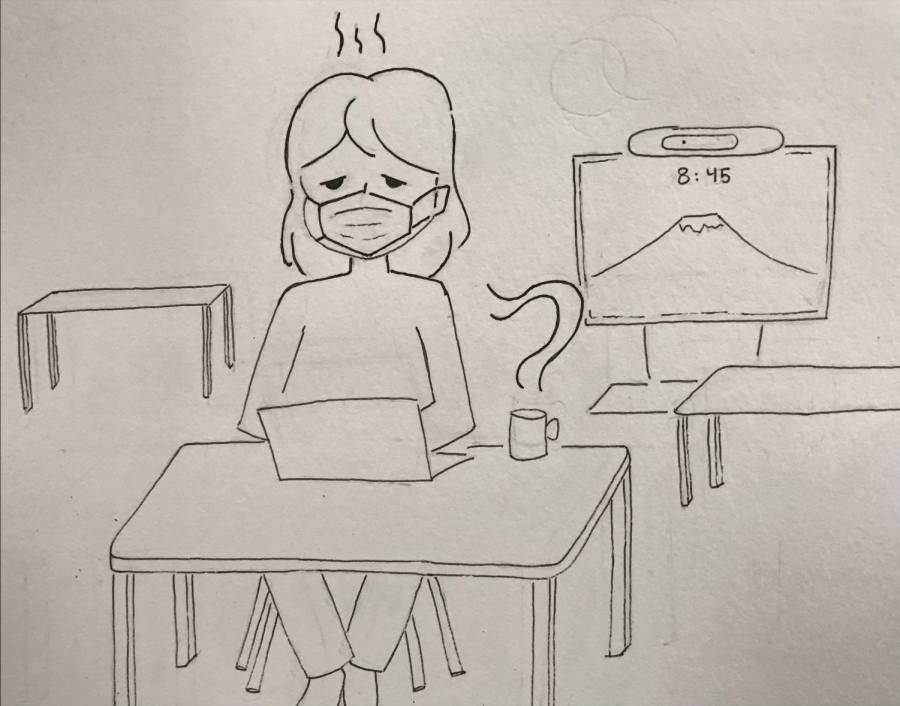Sleep and How to Get It
A Scientific and Slightly Satirical Guide
Photo by Lude Edens
Picture this: it’s 9:00 a.m. and you are sitting in your first period class trying to keep up with all the information being thrown at you. Even though you drank a cup of coffee in the morning and one iced caffe latte on the way to school— just in case— you feel groggy and unmotivated. The countless eye-rubs and inner monologues don’t seem to be helping at all. Eventually you give up on class that day, telling yourself that you will catch up another time. So, what happened?
Well, those were the consequences of staying up until three in the morning doing the biology lab that was assigned last week. I’m sure we all understand the basic importance that sleep has in our lives, but what if I told you it was more than that. In fact, getting a good night’s rest can actually boost your productivity, improve your memory, and strengthen your body, all at the same time.
In a nutshell, sleeping is like the brain’s ‘save’ function. You can think of the primary part of the brain that handles memories, the hippocampus, as a sponge. There are three types of sleep which are cycled through every 90 minutes or so. Deep sleep is the first, and also the most important. This type of sleep often occurs earlier in a full night’s rest, which should be about 8-9 hours for the average teenager. During deep sleep, our sponge, the hippocampus, takes all the important information learned throughout the day and transports it to a more permanent storage location. So, if you imagine the water in the sponge as relatively important to its use, then deep sleep is the squeezing of that sponge over the sink, which is where we want the water to be— an amazing analogy, I know.
The second type is light sleep, which occurs most often during the later cycles of a full night’s sleep. Its function is to take all the remaining information and dispose of it. If we were to compare this to the sponge analogy, it is basically what happens when the sponge is cleaned of all its germs and dirt. This may not seem important, but it is actually fundamental to your learning capabilities the following day. Let’s return to the scenario I used earlier. The real reason you were struggling to retain information in class was because your sponge was full of grime. You see, those solid four hours of rest did not lend you the chance to clean your sponge in light sleep, making it impossible to hold any more water the next day.
Last but certainly not least, the third type of sleep is REM sleep. Yes, I know. It’s the term everyone has heard at least once before. While I am sure you are having fun pretending to know what it is, I have an article to write, and my editor would be a lot happier if I get something half decent out. Anyway, REM sleep is scattered throughout each cycle, but is most useful in the later stages of sleep. Its primary function is to make connections between information stored permanently in your brain, both old and new. Basically, it’s the brain’s way of making sense of the new memories. This is called bidirectional linking. In the sponge analogy, think about this process as the water running through the pipeline below your sink and eventually finding its way to the sewer, where it mixes with the rest.
This is all to say that the three stages are immensely important to your learning capabilities. In fact, sleeping for a full eight hours right after studying for December exams is the best way to not only retain information, but understand it.
Knowing that, sleep really does seem like the key to academic success. But I’m only a few paragraph’s in and have some information to share with all you health and gym gurus. What if I were to tell you that sleep deprivation can hinder your gains? Lack of sleep causes a decline in growth hormone secretion, which is central to not only gaining muscle mass, but also growing past 5’6, which I will take advantage of to the fullest tonight. Additionally, sleep enhances muscle recovery and strength through protein synthesis, which, as T2 biology has taught us, is going to be horrible on the exams. Anyway, moving on to the bodily benefits…
Various studies seem to suggest that sleep is also the miracle cure for aging, or at least sort of. It has been shown that the disruption of sleep is a large contributor to cognitive decline in older folks, and a correlation has even been found between lack of sleep and brain diseases such as Alzheimer’s and dementia. In addition, sleep has been found to increase testosterone levels, the size of reproductive organs, and have healthy impacts to the immune and cardiovascular systems. A rather scary, but noteworthy proof of this is the measured effects of daylight savings time on death rates worldwide. In the spring when an hour of sleep is lost, a 24% increase in heart attacks is seen the following day. Contrarily, in the fall when an hour of sleep is gained, there is a 21% decrease in heart attacks recorded the next day. Changes in the number of traffic accidents and suicide rates follow similar trends.
Sleep deprivation can have scary effects on our health, but luckily, there are ways to increase the amount of sleep you’re getting. While the use of sleeping pills is not recommended by neurologists due to their unnatural results, cutting out caffeine and device usage before sleep can be very beneficial to getting those eight hours of sleep. Additionally, here are three tricks to help you fall asleep faster.
Firstly, temperature is the best and simplest way to sleep better. People tend to fall asleep easier in a cold environment, because the body needs to lower its core temperature by 2-3 degrees Fahrenheit to initiate and stay asleep. Aim for around 65°F or 18°C. A great way to manipulate your body temperature is to take a hot shower before sleeping, as your body will react by lowering its internal temperature.
Light can also be utilized to help you sleep better. The amount of light present is a signifier to the brain that it is time to sleep. Lower light levels during the night will make sleeping easier, while brighter light in the morning, such as sunlight, will make waking up easier. This is why device usage before bed is so detrimental to sleep.
Most importantly, regularity is extremely important to the timing of drowsiness. The brain is governed by habits, and so going to bed and waking up at similar times every day will trick your brain into releasing your hormonal urge to curl up in your sheets and cry yourself to sleep because you procrastinated your exam prep until the weekend before. Additionally, a great tip if you’re having trouble sleeping is to leave your bed and do something else for a short while. This is because the brain will quickly associate the bedroom with a place of wakefulness, which must be broken. The bed is ultimately a place for sleep, and so helping your brain understand that is a useful tool. The golden rule is, you would never sit at the dinner table waiting to get hungry, so why would you lie in bed waiting to get sleepy?
I advise you to keep this in mind when studying for the dreadful midterm exams coming up. Sleep is a fundamental part of performing well, and staying healthy while you’re at it.

Hello! My name is Lude and my pronouns are she/her. I'm in the class of 2023 and I've been at UNISVerse since T1. My favorite articles to read, write,...












